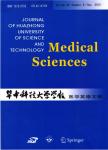Prognostic Value of Sox2 Expression in Digestive Tract Cancers: A Meta-analysis
Prognostic Value of Sox2 Expression in Digestive Tract Cancers: A Meta-analysis作者机构:Department of Pathology & Key Laboratory of Xinjiang Endemic and Ethnic DiseasesShihezi University School of Medicine
出 版 物:《Journal of Huazhong University of Science and Technology(Medical Sciences)》 (华中科技大学学报(医学英德文版))
年 卷 期:2016年第36卷第3期
页 面:305-312页
核心收录:
学科分类:1002[医学-临床医学] 100214[医学-肿瘤学] 10[医学]
基 金:supported by the National Natural Science Foundation of China(No.81560433) Scientific Research Inovation Project of Xinjiang Graduate(No.XJGR12014065)
主 题:Sox2 digestive tract cancer prognosis meta analysis
摘 要:The aim of the present study was to accurately evaluate the association of Sox2 expression with the survival of patients with digestive tract cancers. Relevant literatures were identified by comprehensively searching databases including the Pubmed, Embase, CBMdisc, and Wanfang(up to October 2014). A meta-analysis was performed to clarify the association between Sox2 expression and overall survival or clinicopathological parameters of patients with digestive tract cancers(esophageal, gastric, and colorectal cancers). The results showed a significant association between high Sox2 expression and poor overall survival in patients with digestive tract carcinomas(HR=1.55, 95% CI=1.04–2.31), especially for patients with esophageal cancer(HR=2.04, 95%CI=1.30–3.22), colorectal cancer(HR=1.40, 95% CI=1.04–1.89), and digestive tract adenocarcinoma(HR=1.80, 95% CI=1.12–2.89), for Europeans(HR=1.98, 95% CI=1.44–2.71) or patients who did not receive neoadjuvant treatment(HR=1.73, 95% CI=1.10–2.72). Furthermore, Sox2 over-expression was highly correlated with vascular invasion(OR=1.86, 95% CI=1.25–2.77) and poor differentiation(OR=1.88, 95% CI=1.14–3.08), especially in esophageal and colorectal cancers. In conclusion, Sox2 expression may serve as a novel prognostic factor for patients with digestive tract cancers. Over-expression of Sox2 that is correlated with vascular invasion and poor differentiation suggests poor outcomes of patients with digestive tract cancers.



